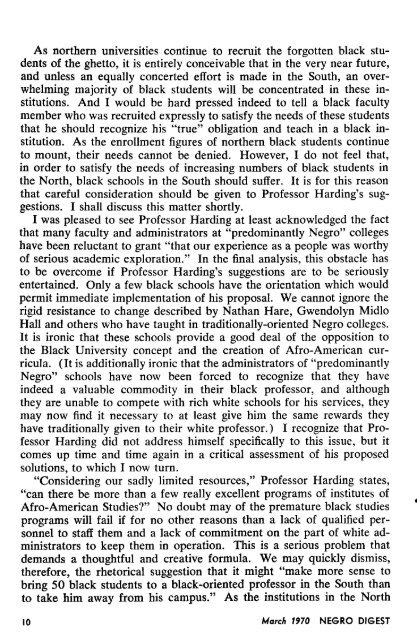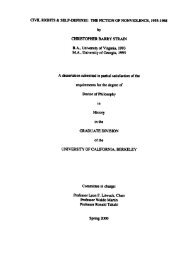Negro Digest - Freedom Archives
Negro Digest - Freedom Archives
Negro Digest - Freedom Archives
You also want an ePaper? Increase the reach of your titles
YUMPU automatically turns print PDFs into web optimized ePapers that Google loves.
As northern universities continue to recruit the forgotten black students<br />
of the ghetto, it is entirely conceivable that in the very near future,<br />
and unless an equally concerted effort is made in the South, an overwhelming<br />
majority of black students will be concentrated in these institutions<br />
. And I would be hard pressed indeed to tell a black faculty<br />
member who was recruited expressly to satisfy the needs of these students<br />
that he should recognize his "true" obligation and teach in a black institution<br />
. As the enrollment figures of northern black students continue<br />
to mount, their needs cannot be denied . However, I do not feel that,<br />
in order to satisfy the needs of increasing numbers of black students in<br />
the North, black schools in the South should suffer . It is for this reason<br />
that careful consideration should be given to Professor Harding's suggestions<br />
. I shall discuss this matter shortly .<br />
I was pleased to see Professor Harding at least acknowledged the fact<br />
that many faculty and administrators at "predominantly <strong>Negro</strong>" colleges<br />
have been reluctant to grant "that our experience as a people was worthy<br />
of serious academic exploration ." In the final analysis, this obstacle has<br />
to be overcome if Professor Harding's suggestions are to be seriously<br />
entertained . Only a few black schools have the orientation which would<br />
permit immediate implementation of his proposal . We cannot ignore the<br />
rigid resistance to change described by Nathan Hare, Gwendolyn Midlo<br />
Hall and others who have taught in traditionally-oriented <strong>Negro</strong> colleges .<br />
It is ironic that these schools provide a good deal of the opposition to<br />
the Black University concept and the creation of Afro-American curricula<br />
. (It is additionally ironic that the administrators of "predominantly<br />
<strong>Negro</strong>" schools have now been forced to recognize that they have<br />
indeed a valuable commodity in their black professor, and although<br />
they are unable to compete with rich white schools for his services, they<br />
may now find it necessary to at least give him the same rewards they<br />
have traditionally given to their white professor . ) I recognize that Professor<br />
Harding did not address himself specifically to this issue, but it<br />
comes up time and time again in a critical assessment of his proposed<br />
solutions, to which I now turn .<br />
"Considering our sadly limited resources," Professor Harding states,<br />
"can there be more than a few really excellent programs of institutes of<br />
Afro-American Studies?" No doubt may of the premature black studies<br />
programs will fail if for no other reasons than a lack of qualified personnel<br />
to staff them and a lack of commitment on the part of white administrators<br />
to keep them in operation . This is a serious problem that<br />
demands a thoughtful and creative formula. We may quickly dismiss,<br />
therefore, the rhetorical suggestion that it might "make more sense to<br />
bring 50 black students to a black-oriented professor in the South than<br />
to take him away from his campus ." As the institutions in the North<br />
10 March 1970 NEGRO DIGEST
















